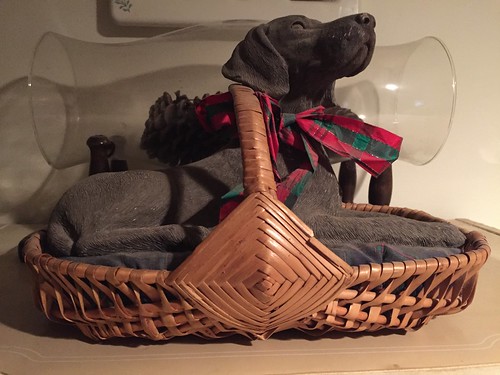This week, she talked about her dog, Moose, whose death spurred her to start the newsletter. I wrote back to let her know that I, too, once had a dog named Moose, and that dogs named Moose are generally the best dogs.
Moose was one of the iconic dogs of my childhood, a large weimaraner with amber eyes whose real name wasn't actually Moose. Since he was a purebred, with papers and a bloodline, his official name was Baron of Ulster. My parents are from Ulster County, New York, so this probably made sense to them, but for most of his life we called him Moose, and that's what he answered to. In his later years, my brother took to calling him Vern for reasons unknown to me, and he sometimes answered to that as well.
Moose tumbled into our lives in 1980, when we were living at the Stewart Air Force Base. I was four, about to turn five later in the year, when Moose exploded onto the scene. The explosion was literal: Gretchen, Moose's mother, gave birth to him in our house during a Cub Scouts meeting. My mom, excellent multi-tasker, kept the meeting running while ducking into the other room to midwife the puppies. I barely remember Gretchen, as she had a stroke while giving birth and only lived a few more weeks, but I remember the puppies. Since they all looked the same except the small tiny runt of the litter who, I think, died, my mom tied colored string around their necks so that we could tell them apart, and we called them by the names of their strings: Blackie, Greenie, Bluey, and a few other colors.
I have no idea which color Moose was, but he was the one we kept, and he moved with us to Kentucky, then to Alaska, then back to New York. We also had Yapper, a hateful fox terrier that my parents had before I was born and who never liked me until he was much older and dying, for most of this time, so each time we moved my parents drove two kids, a fox terrier, and a large weimaraner across the country. Coming back from Alaska, they also transported a caged gerbil, because I was unwilling to give him up. When we lived in Kentucky we briefly also had two beagles, Bandit and Old Yeller, but they did not move with us to Alaska, and lived at a kennel, never at our house, so they never actually felt like pets. I'm not sure if we sold them or just gave them away, and now that I realize I don't know I'm afraid to ask my parents because I don't want to hear that they sent them to a shelter.
Knowing how my parents value dogs, I don't think they did, but again, I choose not to find out for sure.
Maybe they went to live out at a big farm in the country, with lots of room to run around and other dogs to play with.
There aren't really any definitive stories about Moose. He didn't save a bus full of schoolchildren from an oncoming train, or run for help when I fell down a well. (I didn't actually fall down a well. I'm making a Lassie reference. I did fall into a pool once, while dressed as a ghost in a sheet with no eyeholes cut into it, but that's a story for another day. Moose did not save me then, either.) In his later years, he was missing a tooth, because my brother was playing a game with him in the backyard where he'd hit a ball with a bat and Moose would bring it back, and Moose got too close while he was hitting and caught the bat on the backswing, knocking his tooth out. The vet offered to put in a steel tooth, which my brother and I thought was the best idea ever but which my parents vetoed.
In thinking about him for the past few days, I realized that my memories about Moose are hazy in two significant ways:
1) He didn't live as long as I thought he did. I remember us having him forever, through so many homes and moves. He was always a warm, large, but somehow soft presence, rubbing his head against your leg to get petted or curling up on a couch cushion. I remember him in so many of our homes and backyards, coming back from hunting trips with dad or barking at neighbor kids when they ran into our yards, but when I checked the plaque on his statue:

it turns out that we put him to sleep in 1991, when he was eleven.
And I use the word "we" very generously above, as I think my mom actually had to take him to the vet herself because we were too sad and wouldn't go with her. My dad might have gone, but I don't remember.
2) I struggle to remember him as an older dog. I know that he aged. I know he got cataracts and had trouble seeing out of one eye. His joints hurt him, and he couldn't go hunting anymore, because charging through the woods left him laid up in pain for days. I vaguely remember that he had trouble climbing up onto the couch or jumping down from it, but I don't remember what the final illness was. Instead, when I picture him in my head I remember him how he was when we lived in Alaska, which I guess was middle age for him.
I mostly just remember that he loved us, and he was a good dog.